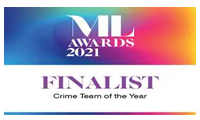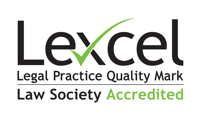
Disclosure & Barring Service Lawyers
Put your trust in Clifford Johnston & Co.
- Disclosure & Barring Service (DBS) Experts
- Lexcel and Law Society Accreditations
- Experts at Protecting Your Career
- Talk to a Disclosure & Barring Service Solicitor
DBS Defence Lawyers
If you have been notified by the Disclosure & Barring Service (DBS) of its intention to place you on a barred list, the expert solicitors at Clifford Johnston & Co. will provide you with the specialist legal advice you need to achieve an outcome that will allow you to get on with your life.
We have 30 years of experience and have helped clients successfully avoid being placed on the barred list, in addition to successfully appealing decisions made by the DBS which could have resulted in huge damage to their careers and personal lives.
Being added to a barred list could have a devastating effect on your life, preventing you from working with children and/or vulnerable adults and potentially destroying your hard-earned livelihood.
Our solicitors can assist you in relation to any type of referral to the DBS, including:
- False allegations
- Isolated incidents
- Historical allegations
- Breach of professional boundaries
- Neglect
- Fraud/dishonesty
If you have been contacted by the DBS, get in touch with us as soon asnpossible for a free initial consultation, which will be handled with the utmost sensitivity.
How Clifford Johnston & Co. can help
Seeking representation and advice from lawyers with specialist knowledge of this challenging area of law is essential.
The tenacious and decisive specialist Disclosure & Barring Service (DBS) solicitors at Clifford Johnston & Co have many years of experience helping those dealing with the DBS to achieve a successful outcome.
Our team provide the highest standard of legal services, representation and advice relating to the following:
- Representations to the DBS if you have received a ‘minded to bar’ letter.
- Appealing entries disclosed on enhanced DBS c
- Removing or editing entries re cautions and convictions from the Police National Computer (PNC) and, consequently, DBS
- Deleting biometric data held against your name
What is the Disclosure and Barring Service (DBS)?
The DBS is a government agency and which helps employers in the United Kingdom make safer recruitment decisions by preventing unsuitable people from working with children and vulnerable adults. The DBS also decides whether a person should be added to one or both barred lists and prohibited from engaging in any regulated activity.
The Safeguarding Vulnerable Groups Act 2006 requires the DBS to maintain a children’s and vulnerable adults barred list. This means that the DBS has a list of individuals who are prohibited from engaging in what is known as ‘regulated activity’. Its aim is to maintain the safety of children and vulnerable adults by preventing individuals from working in jobs in sectors they are not permitted to work in.
It is a criminal offence for a person, included on a barred list, to seek employment in regulated activity with a group for which they are barred. For example, if you are on the children’s barred list, you must not seek employment as a teacher or even volunteer at a children’s sports club.
What are the DBS barred lists?
There are two barred lists, namely
- The children’s barred list – people who have been banned from working with children
- The adult’s barred list – people who have been banned from working with vulnerable adults
The DBS can only bar a person from working in regulated activity with children or adults if it believes the person is, has been, or might in the future be engaged in regulated activity. The only exception to this is if the individual has been convicted of certain criminal offences which automatically leads to them being placed on the barred lists.
Why have I been referred to the DBS?
There are three ways that could result in you being referred to the DBS for consideration as to whether you should be included on the barred list:
(i) On enhanced DBScheck applications – this could lead the police to notify the DBS if they think a person should be considered for inclusion on the barred lists.
(ii) Discretionary Referral – these types of cases can be referred to the DBS by a member of the public, but most come from:
- local authorities
- employers and other regulated activity providers
- health and social care organisations
- professional regulatory bodies
Regulated activity providers have a legal duty to make a referral to the DBS when they:
- dismiss an employee because they harmed a child/vulnerable adult, or where there is a risk of harm.
- remove an employee from working in regulated activity because they harmed a child/vulnerable adult, or where there is a risk of harm, or
- were planning to dismiss an employee before they left for either of the above reasons.
(iii) Automatic barring offence (Autobar) – When an individual is cautioned and/or convicted of certain serious offences and/or has been issued with a Risk of Sexual Harm Order, they are either automatically added to the barred lists or automatically considered for addition to the barred lists.
How will I notified if the DBS are considering adding me to the barred list?
If you have been added, or are at risk of being added, to one or both of the barred lists, the DBS will notify you in writing in one of two ways:
- Notification of inclusion in a barred list – if you have been convicted of certain serious offences, you will automatically be added to the barred lists.
- Notification of ‘Minded to bar’ – if the DBS has received information about you which leads them to consider whether to include you in the barred lists, it will write to you setting out its concerns and provide you with a copy of the evidence which it intends to rely on. You will then be given the opportunity to respond. It is at this early stage of the process that it is crucially important to seek specialist legal advice.
Should I respond to the DBS?
Yes, absolutely. Being added to barred list is a draconian measure which could have devastating consequences for you. It would prevent you from working in any regulated activity with children and/or vulnerable adults. Not only would this prohibit you from working in the care and teaching profession, but it would also prevent you from helping out your children’s sports team for example.
The restrictions on employment and volunteer work would be huge. In addition, a decision to bar you could have serious financial implications and potentially the loss of a successful career.
In our experience, the DBS is more likely to add you to the barred lists if you do not engage with it and do not submit a response. Although you are not under any obligation to submit representations, it is important to understand that, if you do not provide any evidence to support your case, then the DBS will make a final decision based on the information it has collated.
The DBS will usually give you 8 weeks to respond to its ‘minded to bar’ letter.
It is vital that you seek legal advice from a specialist DBS solicitor as soon as possible and no later than receipt of a ‘minded to bar’ letter. We can assist you in drafting a response and prepare a defence bundle of documents which may include insight, reflection, evidence of remediation such as the attendance on relevant courses, and testimonials.
Once the time period to submit representations has passed, your case will be reassessed and a final decision will be made by the DBS. You will be notified of the same in writing.
If you are added to the barred lists, the intention is for you to remain on it for life. However, depending on certain factors such as your age, you can ask the DBS to review its decision after a specific period of time.
What is a DBS check?
There are four kinds of DBS checks, previously known as CRB checks (Criminal Record Bureau):
- Basic DBS check – this contains details of ‘unspent’ convictions and conditional cautions.
- Standard DBS check – this will include details of both spent and unspent convictions, cautions (unless filtered), reprimands and warnings held on the Police National Computer.
- Enhanced DBS check – in addition to the above, this may include any other information held by the police and is relevant to the role you applied for. This could include details of allegations which did not result in a charge, let alone conviction.
- Enhanced DBS check with Barred List checks – this will show all of the above and will include a check on the barred lists that the DNB manages and maintains.
If you apply for a role in any of the following sectors, the organization is required to request an enhanced DBS check:
- Social work
- Healthcare for children or vulnerable adults
- Teaching, caring and supervising
- Childminding and foster care
- Healthcare for vulnerable adults
- Money or financial advice and support due to illness, age or disability
- Transport due to illness, age or disability
Each DBS check generates a DBS certificate for the individual, which employers can ask to review during the recruitment process.
If there is a mistake on my DBS certificate, can I appeal it?
In short, yes you can. The DBS is not immune from mistakes and it may have incorrect information about your convictions or cautions for example. This could have disastrous consequences for you.
Our team of specialist DBS lawyers can help you and ensure that your DBS certificate is accurate.
Will non convictions appear on my DBS check?
Unfortunately, this is possible. An Enhanced DBS certificate may include details of other allegations which led to you being investigated or arrested, but never charged. It may also include allegations which led to you being charged with an offence, but acquitted at Court. In addition, the check includes details of all convictions on record, whether spent or unspent under the Rehabilitation of Offenders Act 1974.
Are DBS Proceedings linked to Professional Discipline proceedings?
Although DBS proceedings and professional discipline cases are completely separate, you may find yourself subject to both.
Our team of specialist DBS solicitors act for many different professionals, including teachers, nurses, midwives, doctors, dentists, health care practitioners and social workers. Many of our clients face simultaneously investigations by the DBS and their Regulator such as the Teaching Regulation Agency, the Nursing and Midwifery Council, the General Medical Council, the General Dental Council, the Health Care Practitioners Council and Social Work England.
We understand the potential consequences for your career, your reputation, your financial stability and the impact on you personally and your family. We are proud of our reputation and track record in representing professional clients over the last 30 years. We are one of two Regulatory Law Solicitor Firms in the UK who frequently represent members of the major trade unions such as Unison, the Prison Officer Association, the Royal College of Midwives and the National Association of Headteachers. The unions choose us because of our experience, reputation, expertise and skill. We take a pro-active stance and are meticulous in our preparation of cases.
Get in Touch
If you have received any correspondence from the DBS, or are subject to a professional disciplinary investigation or proceedings, please get in touch as soon as possible.
Contact our specialist discipline lawyers and DBS solicitors to arrange a confidential, discussion on 01612492700 or j.mcnally@cj-law.co.uk
Legal Team

Need some professional advice?
Do you have any issues that you are worried about? Contact our professional team for a free, no-obligation informal discussion, where we can discuss your particular requirements in greater detail.













